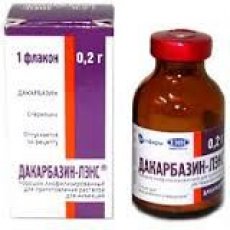Medical expert of the article
New publications
Preparations
Dacarbazine
Last reviewed: 03.07.2025

All iLive content is medically reviewed or fact checked to ensure as much factual accuracy as possible.
We have strict sourcing guidelines and only link to reputable media sites, academic research institutions and, whenever possible, medically peer reviewed studies. Note that the numbers in parentheses ([1], [2], etc.) are clickable links to these studies.
If you feel that any of our content is inaccurate, out-of-date, or otherwise questionable, please select it and press Ctrl + Enter.

Indications Dacarbazine
Indications for the use of Dacarbazine are malignant diseases of tissues and organs:
- treatment of melanoma, lymphogranulomatosis, sarcoma (except multiple hemorrhagic sarcomatosis);
- complex systemic therapy of osteogenic sarcoma, lymphosarcoma, uterine sarcoma, embryonic rhabdomyosarcoma, peritoneal and pleural mesothelioma;
- treatment of epithelial carcinomas (bronchogenic tumors, multicellular lung cancer, thyroid cancer), neuroblastomas, gliomas, pheochromocytomas.
Pharmacodynamics
Under the influence of the drug, DNA synthesis is disrupted due to the formation of complex compounds with carbocations and the reaction of inhibition of mitotic cellular activity.
The process involves the release of diazomethane, which is capable of forming covalent bonds with functional molecular groups. It may also have an anti-metabolic effect.
Dacarbazine begins to exhibit the highest degree of activity after the process of formation of liver metabolites. The drug does not have phase specificity.
Pharmacokinetics
Immediately after absorption, the drug is quickly distributed without remaining in the blood serum. In small quantities, binding to proteins occurs.
It has poor solubility in lipid compounds. It passes through the blood-brain barrier in relatively small concentrations.
Metabolism is detected in the liver, partially excreted by the kidneys. Partial excretion is about 20 minutes, with disorders of the urinary system, this period is extended.
Almost half of the administered dose is excreted by the kidneys within six hours.
Dosing and administration
The drug is used for intravenous and sometimes intra-arterial administration. The dosage is set strictly individually, if necessary, combining with other chemotherapeutic agents, taking into account the degree of possible intoxication and the dynamics of the disease.
The therapeutic solution is prepared in combination with water for injection in a ratio of 10 mg of the drug per 1 ml of water. The drip method of administration involves adding a 5% dextrose solution or isotonic sodium chloride solution to 250 ml.
Prepared infusion solutions can be stored for up to three days in a refrigerator, or up to 8 hours at a temperature of up to 24 C.
The therapy cycle lasts about a week with a further break of 21 days. The duration of the cycles and their number are determined by the doctor on an individual basis.
Use Dacarbazine during pregnancy
This drug has strict contraindications for use during pregnancy and breastfeeding. Recent scientific studies have confirmed the teratogenic effect of Dacarbazine on the embryo.
When treating women of reproductive age, the latter are advised to abstain from sexual intercourse during the period of therapy or to use reliable contraceptives.
Lactation should be stopped during treatment with the drug.
Contraindications
Contraindications to taking Dacarbazine are:
- allergic sensitivity to any of the components of the drug;
- bone marrow dysfunction;
- severe disorders of the liver and urinary system;
- the period of bearing and feeding a child;
- depression of central nervous system functions;
- viral, fungal and bacterial infections (due to the possibility of uncontrolled growth of the process);
- use of radiation therapy.
Side effects Dacarbazine
Side effects from treatment with the drug are quite common and may include the following symptoms:
- bleeding gums, hemorrhages of the digestive system, dyspeptic disorders, pain in the liver and stomach, thrombotic lesions of the veins of the liver;
- anemia, thrombophlebitis, hemorrhages in organs and mucous membranes;
- urinary outflow disorders, menstrual cycle disorders, spermatogenesis;
- disturbances in skin sensitivity, redness of the skin, appearance of swelling;
- in the area of drug administration, tissue trophic disorders and the appearance of scars are possible;
- hyperthermia, decreased immunity, diffuse pain, anaphylaxis.
 [ 19 ]
[ 19 ]
Overdose
The following signs of drug overdose are possible:
- dyspeptic disorders;
- damage to the bone marrow and a decrease in its hematopoietic activity;
- febrile conditions;
- scattered hemorrhages.
There is no specific treatment for symptoms of overdose with Dacarbazine. Symptomatic therapy measures are taken, strict control of the functionality of all organs and systems is carried out, blood transfusion may be prescribed, and certain types of antibiotics may be used.
Interactions with other drugs
When dacarbazine enters the body, it has a certain toxic effect on it: this effect can be enhanced by the simultaneous use of certain sleeping pills, as well as rifampicin, phenytoin.
The drug may enhance the effects of allopurinol, azathioprine, and mercaptopurine on the body.
Photosensitizing effect is possible in combination with methoxypsoralen.
There is chemical incompatibility of Dacarbazine with heparin preparations, hydrocortisone, sodium bicarbonate.
Storage conditions
The drug should be stored in a medical institution or pharmacy in a safe or a locked cabinet, in a cool and dark place. It requires special care during storage and use, so all manipulations with the drug are carried out by special personnel knowledgeable in chemotherapy issues, using certain protection methods.
Attention!
To simplify the perception of information, this instruction for use of the drug "Dacarbazine" translated and presented in a special form on the basis of the official instructions for medical use of the drug. Before use read the annotation that came directly to medicines.
Description provided for informational purposes and is not a guide to self-healing. The need for this drug, the purpose of the treatment regimen, methods and dose of the drug is determined solely by the attending physician. Self-medication is dangerous for your health.

